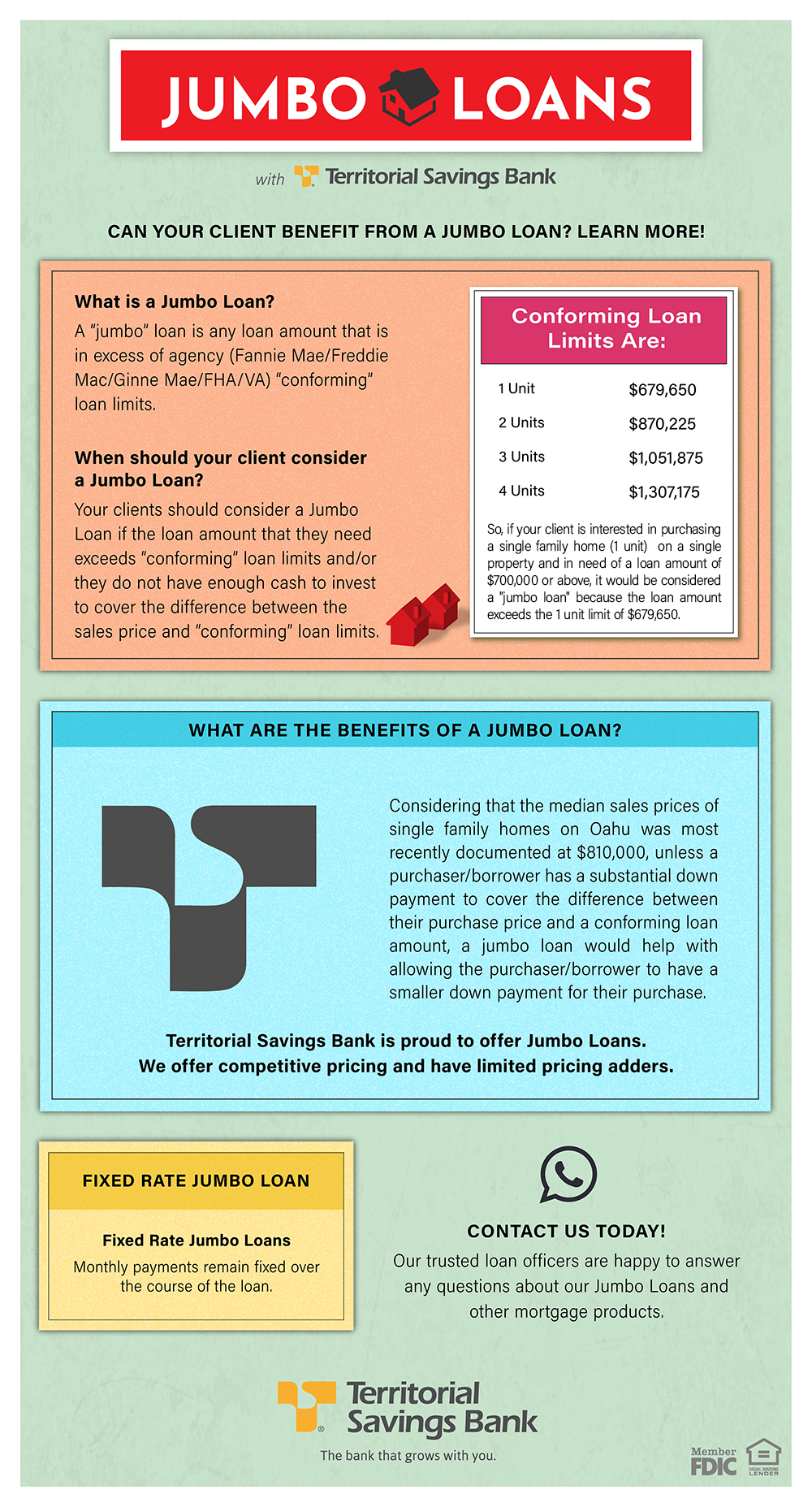Comprehending Jumbo Loan: What You Need to Know for High-end Home Purchases
Comprehending Jumbo Loan: What You Need to Know for High-end Home Purchases
Blog Article
Browsing the Jumbo Financing Landscape: Important Insights for First-Time Homebuyers
Browsing the complexities of jumbo car loans provides a special collection of challenges for novice property buyers, particularly in a progressing actual estate market. Understanding the crucial qualification demands and prospective advantages, along with the drawbacks, is crucial for making informed choices. In addition, creating a solid financial strategy can significantly improve your prospects.
Understanding Jumbo Finances

Because big financings are not backed by government-sponsored entities, they bring different underwriting standards and require more thorough financial paperwork. This distinction can result in greater interest rates contrasted to conventional loans, offered the enhanced threat to lenders. However, big finances also supply one-of-a-kind benefits, such as the ability to fund higher-value properties and potentially much more adaptable terms.
Novice homebuyers should likewise understand that protecting a big finance frequently requires a larger deposit, usually varying from 10% to 20%. Additionally, consumers are generally anticipated to show strong credit reliability and a steady revenue to certify. When exploring big financing choices in their search of homeownership., recognizing these subtleties can empower new property buyers to make enlightened decisions.
Eligibility Needs
Safeguarding a big loan calls for meeting details eligibility demands that differ considerably from those of traditional loans. Unlike conventional car loans, which are frequently backed by government-sponsored entities, big financings are not guaranteed or ensured, resulting in stricter requirements.
Furthermore, borrowers have to demonstrate a robust monetary account, which consists of a reduced debt-to-income (DTI) ratio, usually no greater than 43%. This guarantees that customers can handle their monthly settlements alongside various other monetary responsibilities.
In addition, most lenders call for considerable paperwork, including proof of income, property statements, and tax obligation returns for the previous two years. A substantial down payment is likewise important; while conventional car loans may allow deposits as reduced as 3%, big finances typically require at the very least 20%, relying on the lending and the lending institution amount.

Benefits of Jumbo Fundings
For several new property buyers, jumbo finances provide distinctive advantages that can help with the trip towards homeownership. Among the primary benefits is the capacity to finance buildings that go beyond the adapting financing limitations established by government-sponsored entities. This versatility allows customers to access a bigger range of high-value properties in affordable property markets.
In addition, big finances often include attractive rates of interest that can be less than those of traditional finances, especially for debtors with solid debt accounts. This can lead to significant savings over the life of the loan, making homeownership a lot more budget-friendly. Big financings normally permit for greater finance amounts without the need for personal home mortgage insurance (PMI), which can further lower total prices and monthly settlements.

Possible Disadvantages
Numerous potential buyers may find that jumbo fundings come with considerable downsides that necessitate careful consideration. One of the key concerns is the stringent certification criteria. Unlike conforming lendings, jumbo financings commonly require greater credit report, typically exceeding 700, and considerable revenue documentation, making them much less accessible for some consumers.
Furthermore, big loans typically include greater passion prices contrasted to conventional financings, which can cause enhanced regular monthly repayments and general borrowing prices. This costs may be particularly troublesome for first-time buyers that are already browsing the financial complexities of find more buying a home.
Another significant downside is the bigger deposit requirement. Many lenders anticipate a minimum his response deposit of 20% or more, which can position a challenge for purchasers with restricted cost savings. Moreover, the absence of federal government support for big finances causes much less desirable terms and problems, increasing the danger for loan providers and, consequently, the loaning costs for homeowners.
Last but not least, market variations can substantially influence the resale value of high-end buildings financed with big car loans, adding an element of monetary changability that first-time buyers may find difficult.
Tips for First-Time Homebuyers
Browsing the complexities of the homebuying process can be overwhelming for novice buyers, particularly when considering big financings (jumbo loan). To streamline this trip, sticking to some crucial approaches can make a substantial distinction
First, enlighten yourself on big fundings and their particular requirements. Understand the different financing standards, including debt scores, debt-to-income proportions, and down settlement assumptions. Commonly, a minimal credit history of 700 and a deposit of at the very least 20% are important for approval.
2nd, engage with an educated home mortgage professional. They can give understandings tailored to your monetary situation and help you navigate the complexities of the big financing landscape.
Third, consider pre-approval to strengthen your purchasing position. A pre-approval letter signals to sellers that you are a severe purchaser, which can be beneficial in open markets.
Lastly, do not forget the significance of budgeting. Consider all expenses related to homeownership, consisting of real estate tax, maintenance, and homeowners' insurance. By complying with these ideas, first-time purchasers can come close to the jumbo lending process with better confidence and clearness, boosting their chances of successful homeownership.
Verdict
In conclusion, browsing the jumbo funding landscape needs a thorough understanding of qualification standards, benefits, and potential disadvantages. Eventually, complete preparation and education and learning pertaining to big finances can lead to more informed decision-making in the homebuying procedure.
When navigating the intricacies of the housing market, understanding jumbo loans is critical for novice homebuyers aiming for Full Article properties that surpass conventional lending restrictions. Jumbo finances are non-conforming financings that typically surpass the adapting loan restriction set by the Federal Real Estate Money Agency (FHFA)Additionally, big lendings frequently come with eye-catching rate of interest prices that can be lower than those of conventional finances, particularly for debtors with strong credit rating accounts. Big fundings generally allow for greater loan quantities without the demand for exclusive mortgage insurance coverage (PMI), which can even more lower monthly repayments and overall costs.
Unlike adapting lendings, jumbo loans generally need higher credit score ratings, typically exceeding 700, and considerable income documents, making them less obtainable for some customers.
Report this page